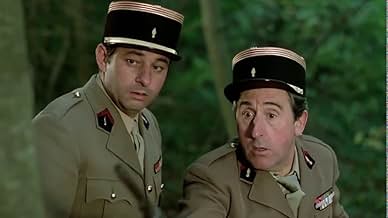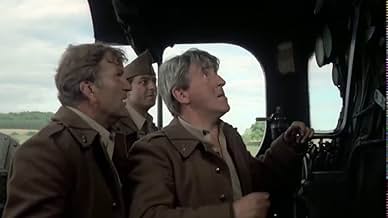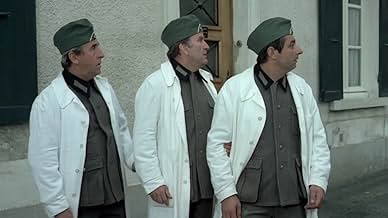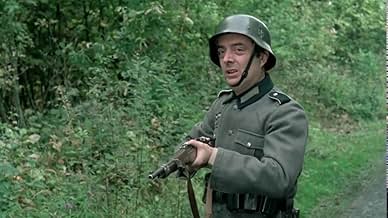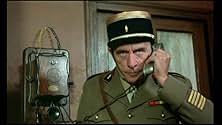VALUTAZIONE IMDb
6,7/10
1914
LA TUA VALUTAZIONE
Aggiungi una trama nella tua linguaThe French army's 7th Company experiences a severe setback during World War II when it gets separated from other units of its army. They disguise themselves as officers to escape death when ... Leggi tuttoThe French army's 7th Company experiences a severe setback during World War II when it gets separated from other units of its army. They disguise themselves as officers to escape death when they are taken prisoner by the Germans.The French army's 7th Company experiences a severe setback during World War II when it gets separated from other units of its army. They disguise themselves as officers to escape death when they are taken prisoner by the Germans.
Trama
Lo sapevi?
- QuizTwo journalists from "Le Petit Journal de Sagy" who were reporting on the making of the movie, Guy Paris and Serge Paris, were asked to appear as two German soldiers.
- BlooperWhen the train engine is decoupled from its wagons, these are shown following the engine with an increasing distance, as they are not pulled anymore. In one cut-in scene these wagons are driving in the opposite direction, changing back again with the next cut.
- ConnessioniFollowed by La 7ème compagnie au clair de lune (1977)
Recensione in evidenza
The first film was Saving Private Ryan meets Laurel and Hardy. Thematically it was a satirical war movie aimed at France, the French and their own storytelling of the war, disguised as a slapstick comedy. I liked the first one a lot and was pleasantly surprised at the commitment to the war movie motif. I like this one even more.
Here, in the tradition of The Empire Strikes Back, or Godfather Part II, and all the great sequels, it builds upon the solid foundations of the first movie, and also expands them in scale and in scope. Not only does it do everything the first one did right but it also introduces new elements that give this film an even deeper meaning, yet always remaining a light-hearted comedy.
The first film, goofy comedy about three bumbling soldiers that get cut-off behind enemy lines, was foremost a critique of the French Army, and of the official established narrative. One element that was not absent but underdeveloped was the social commentary. It is very brief but the movie implied a social distance between the silver-spooned handsome young aviator Lieutenant and the blue-collar middle-aged foot-soldiers.
This film unabashedly leans into this theme, exploits it fully, and it is magnificent. The movie is an total indictment against the officer corps, both French and German to a certain extent. It is an indictment of the class structure of the officer corps, of the arrogance and self-image of the French Army and the utter incompetence of the higher-ups. Yet, it also shows the injustice in war and how not everyone bears these fateful consequences equally. It shows that even in the face of resounding defeat the officers do not acknowledge responsibility or express regret. And, it shows that whatever happens they are still treated with respect and dignity, while the soldiers they led to defeat are mercilessly treated by the Germans. This film is a metaphorical ass whooping on the French Army cadre that led the country to a resounding defeat. It is funnier, and more impactful than any history book. It is more effective than Paths of Glory. It is complete and definitive because it is shown through every angle.
Tonally, and structurally the movie remains the same as previously. The comedy and the slapstick humour is the main focus and the scenes are built around jokes and funny situations. Also the story is told through a series of semi-independent vignettes of encounters with various "stereotypes". We also get this time some things that the first one had glossed over like the nymphomaniac that sleeps with the enemy, the strong-willed widow and so on. The picture is less complete, or all-encompassing compared to the first one, but it still works in portraying a French society in the early phases of occupation and the various issues it arises.
Separately these movies are not necessarily worthy of attention, but as a series it is very engaging and a wonderful example of the power of cinema. Because it is clear and so pure in its storytelling and so confident with the force of its argument.
Here, in the tradition of The Empire Strikes Back, or Godfather Part II, and all the great sequels, it builds upon the solid foundations of the first movie, and also expands them in scale and in scope. Not only does it do everything the first one did right but it also introduces new elements that give this film an even deeper meaning, yet always remaining a light-hearted comedy.
The first film, goofy comedy about three bumbling soldiers that get cut-off behind enemy lines, was foremost a critique of the French Army, and of the official established narrative. One element that was not absent but underdeveloped was the social commentary. It is very brief but the movie implied a social distance between the silver-spooned handsome young aviator Lieutenant and the blue-collar middle-aged foot-soldiers.
This film unabashedly leans into this theme, exploits it fully, and it is magnificent. The movie is an total indictment against the officer corps, both French and German to a certain extent. It is an indictment of the class structure of the officer corps, of the arrogance and self-image of the French Army and the utter incompetence of the higher-ups. Yet, it also shows the injustice in war and how not everyone bears these fateful consequences equally. It shows that even in the face of resounding defeat the officers do not acknowledge responsibility or express regret. And, it shows that whatever happens they are still treated with respect and dignity, while the soldiers they led to defeat are mercilessly treated by the Germans. This film is a metaphorical ass whooping on the French Army cadre that led the country to a resounding defeat. It is funnier, and more impactful than any history book. It is more effective than Paths of Glory. It is complete and definitive because it is shown through every angle.
Tonally, and structurally the movie remains the same as previously. The comedy and the slapstick humour is the main focus and the scenes are built around jokes and funny situations. Also the story is told through a series of semi-independent vignettes of encounters with various "stereotypes". We also get this time some things that the first one had glossed over like the nymphomaniac that sleeps with the enemy, the strong-willed widow and so on. The picture is less complete, or all-encompassing compared to the first one, but it still works in portraying a French society in the early phases of occupation and the various issues it arises.
Separately these movies are not necessarily worthy of attention, but as a series it is very engaging and a wonderful example of the power of cinema. Because it is clear and so pure in its storytelling and so confident with the force of its argument.
- Criticalstaff
- 4 mar 2021
- Permalink
I più visti
Accedi per valutare e creare un elenco di titoli salvati per ottenere consigli personalizzati
Dettagli
- Data di uscita
- Paese di origine
- Lingua
- Celebre anche come
- The Seventh Company Has Been Found
- Luoghi delle riprese
- Château de Vigny, Rue Beaudoin/Place Rohan, Vigny, Val-d'Oise, Francia(Kommandantur headquarters)
- Aziende produttrici
- Vedi altri crediti dell’azienda su IMDbPro
- Tempo di esecuzione1 ora 30 minuti
- Mix di suoni
- Proporzioni
- 1.66 : 1
Contribuisci a questa pagina
Suggerisci una modifica o aggiungi i contenuti mancanti

Divario superiore
By what name was Tre eroi in fuga (1975) officially released in Canada in English?
Rispondi
![Guarda Bande-Annonce [VO]](https://m.media-amazon.com/images/M/MV5BODNhODIzMWEtNDA0NC00ZDg3LWJlNTUtMjRkMjIwYWUwN2JhXkEyXkFqcGdeQXRodW1ibmFpbC1pbml0aWFsaXplcg@@._V1_QL75_UY281_CR3)
